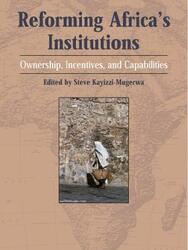Book
Reforming Africa's Institutions
Ownership, Incentives, and Capabilities
There is not a single African country that did not attempt public sector reforms in the 1990s. Governments no longer see themselves as sole suppliers of social services, frequently opting for partnerships with the private sector. Efficiency and choice have entered the language of the planning and implementation units of Africa’s line ministries, while privatization is no longer the controversial subject it was a decade ago. There have also been moves towards more open and democratic governments. Reforming Africa’s Institutions looks at the extent to which reforms undertaken in Sub-Saharan Africa in recent years have enhanced institutional capacities across the breadth of government. To what extent have reforms been internalized and defended by governments? The authors also look specifically at the impact of public sector reforms on these economies and pose the question whether ‘ownership can be attained when countries continue to be heavily dependent on external support.
 Join the network
Join the network